|
|
|
Sort Order |
|
|
|
Items / Page
|
|
|
|
|
|
|
| Srl | Item |
| 1 |
ID:
098399
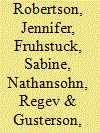

|
|
|
|
|
| Publication |
2010.
|
| Summary/Abstract |
What has distinguished anthropology from the other social sciences is an immersion in sustained fieldwork, itself premised on different kinds and levels of lived and shared experiences, usually with hitherto strangers in another culture in an often distant geographical location. In 2005 the U.S. Department of Defense inaugurated the experimental Human Terrain System, which embeds social scientists with combat brigades to enhance "operational effectiveness" and, supposedly, to reduce civilian casualties. A consensus is emerging among concerned anthropologists that ethnographic fieldwork abroad and within a broad spectrum of military activities and actors can, and must, be employed to challenge the U.S. Army's alarmingly naive concept of "weaponizing culture." The constituent essays in this thematic collection on the vicissitudes of the relationship between war and anthropology take up and complicate the premises of this challenge.
|
|
|
|
|
|
|
|
|
|
|
|
|
|
|
|
| 2 |
ID:
121987
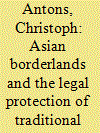

|
|
|
|
|
| Publication |
2013.
|
| Summary/Abstract |
Traditional knowledge related to biodiversity, agriculture, medicine and artistic expressions has recently attracted much interest amongst policy makers, legal academics and social scientists. Several United Nations organizations, such as the World Intellectual Property Organization (WIPO) and the Convention on Biological Diversity under the United Nations Environmental Programme (UNEP), have been working on international models for the protection of such knowledge held by local and indigenous communities. Relevant national, regional or provincial level legislation comes in the form of intellectual property laws and laws related to health, heritage or environmental protection. In practice, however, it has proven difficult to agree on definitions of the subject matter, to delineate local communities and territories holding the knowledge, and to clearly identify the subjects and beneficiaries of the protection. In fact, claims to 'cultural property' and heritage have led to conflicts and tensions between communities, regions and nations. This paper will use Southeast Asian examples and case studies to show the importance of concepts such as Zomia, 'regions of refuge' and mandala as well as 'borderlands' studies to avoid essentialized notions of communities and cultures in order to develop a nuanced understanding of the difficulties for national and international lawmaking in this field. It will also develop a few suggestions on how conflicts and tensions could be avoided or ameliorated.
|
|
|
|
|
|
|
|
|
|
|
|
|
|
|
|
| 3 |
ID:
113095
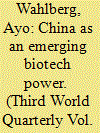

|
|
|
|
|
| Publication |
2012.
|
| Summary/Abstract |
Asia's dramatic entry on to the global biotech scene has not gone unnoticed by commentators and social scientists. Countries like China, India, South Korea and Singapore have been identified as 'emerging biotech powers'. Consequently scholars have begun examining the particularities of how biotechnologies (eg stem cell science, genetic testing and reproductive medicine) have come to be taken up and grounded in a variety of cultural, legal and socioeconomic contexts. They have also examined how governments, scientists, clinicians and others have been engaged in efforts to build up endogenous biotech sectors as a part of nation-building strategies. In this article, rather than attempting to answer questions of what makes biotechnology particularly Asian, I will instead investigate how demarcations and boundaries are mooted in global negotiations of what constitutes 'good' biotechnology. The analysis is based on a collaborative project between Chinese and European scientists and experts on the ethical governance of biomedical and biological research. I show how an underlying condition for the negotiations that took place within this collaboration was the proposition that difference matters when it comes to developing, organising, carrying out and overseeing biotechnological research in a particular country.
|
|
|
|
|
|
|
|
|
|
|
|
|
|
|
|
| 4 |
ID:
098246
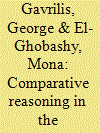

|
|
|
|
|
| Publication |
2009.
|
| Summary/Abstract |
One of the greatest challenges we face as political scientists is to teach undergraduates how to think comparatively. This article proposes a number of practical, easily adaptable exercises that many of us can incorporate in our teaching to turn curious undergraduates into smart social scientists who think comparatively about the world.
|
|
|
|
|
|
|
|
|
|
|
|
|
|
|
|
| 5 |
ID:
145946
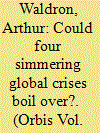

|
|
|
|
|
| Summary/Abstract |
More than once, I have heated milk on a gas stove only to have it boil over disastrously. The U.S. and its allies face at least four major and converging challenges that may also boil over like overheated milk, perhaps simultaneously. Social scientists will have more sophisticated frameworks, but this homely analogy of the full gas stove frames my points.
|
|
|
|
|
|
|
|
|
|
|
|
|
|
|
|
| 6 |
ID:
096961


|
|
|
|
|
| Publication |
2010.
|
| Summary/Abstract |
In this paper the authors draw upon the tradition of Power Structure Research to analyse the increased interpenetration of the military and the social sciences, particularly the recruitment of anthropologists and the adoption and adaptation of counterinsurgency strategies. It is argued that such actors should be understood not as disinterested 'experts' but as being organically embedded in a military-industrial-academic complex. The paper considers a number of contemporary examples as well as considering the historical roots of these trends. It is argued that this interpenetration violates the ethical norms of the academy and the moral and social responsibilities of intellectuals.
|
|
|
|
|
|
|
|
|
|
|
|
|
|
|
|
| 7 |
ID:
095023


|
|
|
|
|
| Publication |
2010.
|
| Summary/Abstract |
The creation of an International Criminal Court (ICC) to prosecute war crimes poses a real puzzle. Why was it created, and more importantly, why do states agree to join this institution? The ICC represents a serious intrusion into a traditional arena of state sovereignty: the right to administer justice to one's one nationals. Yet more than one hundred states have joined. Social scientists are hardly of one mind about this institution, arguing that it is (alternately) dangerous or irrelevant to achieving its main purposes: justice, peace, and stability. By contrast, we theorize that the ICC is a mechanism to assist states in self-binding, and draw on credible commitments theory to understand who commits to the ICC, and the early consequences of such commitments. This approach explains a counterintuitive finding: the states that are both the least and the most vulnerable to the possibility of an ICC case affecting their citizens have committed most readily to the ICC, while potentially vulnerable states with credible alternative means to hold leaders accountable do not. Similarly, ratification of the ICC is associated with tentative steps toward violence reduction and peace in those countries precisely least likely to be able to commit credibly to foreswear atrocities. These findings support the potential usefulness of the ICC as a mechanism for some governments to commit to ratchet down violence and get on the road to peaceful negotiations.
|
|
|
|
|
|
|
|
|
|
|
|
|
|
|
|
| 8 |
ID:
126992
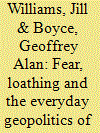

|
|
|
|
|
| Publication |
2013.
|
| Summary/Abstract |
This paper argues for the importance of attending to both affective and emotional experience in analysing the origins and effects of border and immigration efforts in the US/Mexico border region. We do so by engaging with theoretical understands of the politics of affect and emotion among cultural and feminist geographers and social scientists. We then examine Arizona's SB 1070 and its connection to a larger history of border and immigration enforcement in Arizona. Drawing from ethnographic work, interviews, and media and policy analysis, we engage with narratives provided by border area ranchers to unpack how these ranchers' encounters with unauthorised migrants have changed over time. We then examine how the everyday fear and anxiety associated with these encounters drive political activism and state intervention in the region. We conclude by discussing how this intervention, in turn, reproduces racial and gender hierarchies, hierarchies that are themselves affectively mediated.
|
|
|
|
|
|
|
|
|
|
|
|
|
|
|
|
| 9 |
ID:
112871
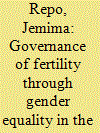

|
|
|
|
|
| Publication |
2012.
|
| Summary/Abstract |
It is generally accepted amongst demographers that a declining fertility rate has negative economic consequences, namely in the guise of a slowdown in economic growth. Declining fertility has, therefore, been seen as a major problem in Japan and the EU for the last 20 years. Over the past two decades, demographers and social scientists have discussed intensely the causal connection between gender equality and female fertility, to the extent that during the past 10 years, gender equality has become the cornerstone of the EU and, to a degree, Japanese public policy aiming to re-optimise fertility rates. This article scrutinises the different ways in which gender equality is erected by demographic and social scientists in Japan and the EU as a technology of governance with the aim of re-exerting control over sexual reproduction. I argue that in the EU, scientists engage directly and endeavour to develop demographic theory based on European case studies, whereas Japanese gender equality policy is developed mainly by measuring the successes of European gender equality policy and considering the results it might yield in Japan. In both cases, however, gender equality is taken up as a tool for the governance of fertility.
|
|
|
|
|
|
|
|
|
|
|
|
|
|
|
|
| 10 |
ID:
121024
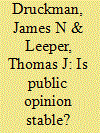

|
|
|
|
|
| Publication |
2012.
|
| Summary/Abstract |
Public opinion matters, both as a central element of democratic theory and as a substantive foundation for political representation. The origins and nature of public opinion have long attracted the attention of social scientists. Yet a number of questions remain; among the more perplexing is whether-and under what conditions-public opinion is stable. The answer depends in large part on whether one looks at aggregations of individual opinions (macro public opinion) or at the individual opinions themselves (micro public opinion). In this essay, we explore the macro/micro divide and offer a framework to determine when opinions are likely to be stable or volatile. This framework reflects both the content of the political environment and the nature of individuals' opinions. Using public opinion dynamics surrounding the Patriot Act as a primary example, we discuss the role of opinion stability in interpreting public opinion and in understanding the normative implications of public preferences.
|
|
|
|
|
|
|
|
|
|
|
|
|
|
|
|
| 11 |
ID:
134385
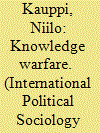

|
|
|
|
|
| Summary/Abstract |
The future of the worlds depends on the knowledge we have of it. Keynes famously added to this that the world is ruled by the ideas of economists and political philosophers- and little else. Bur while nobody would dispute the power of idea, Keynes forgot to add that ideas are always somebody’s ideas. Social group seek to monopolize the ideas they consider valuable and to discredit those that are a threat.
|
|
|
|
|
|
|
|
|
|
|
|
|
|
|
|
| 12 |
ID:
042199


|
|
|
|
|
| Publication |
New Jersey, Prentice Hall Inc., 1972.
|
| Description |
xvi, 1024p.
|
| Standard Number |
0135609879
|
|
|
|
|
|
|
|
|
|
|
|
Copies: C:1/I:0,R:0,Q:0
Circulation
| Accession# | Call# | Current Location | Status | Policy | Location |
| 010710 | 510/REA 010710 | Main | On Shelf | General | |
|
|
|
|
| 13 |
ID:
092086
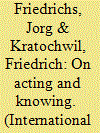

|
|
|
|
|
| Publication |
2009.
|
| Summary/Abstract |
This article moves from deconstruction to reconstruction in research methodology. It proposes pragmatism as a way to escape from epistemological deadlock. We first show that social scientists are mistaken in their hope to obtain warranted knowledge through traditional scientific methods. We then show that pragmatism has grown from tacit commonsense to an explicit item on the agenda of the international relations discipline. We suggest that a coherent pragmatic approach consists of two elements: the recognition of knowledge generation as a social and discursive activity, and the orientation of research toward the generation of useful knowledge. To offer a concrete example of what pragmatic methodology can look like, we propose the research strategy of abduction. We assess various forms of research design to further elucidate how pragmatic research works in practice.
|
|
|
|
|
|
|
|
|
|
|
|
|
|
|
|
| 14 |
ID:
131553
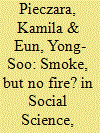

|
|
|
|
|
| Publication |
2014.
|
| Summary/Abstract |
Causality in social science is hard to establish even through the finest comparative research. To ease the task of extracting causes from comparisons, we present the benefits of tracing particularities in any phenomenon under investigation. We introduce three real-world examples from 2011: British riots, worldwide anticapitalist protests, and the highway crash near Taunton in southwestern England. Whereas all of these three examples have broad causes, we embark on the quest after specific factors. The Taunton accident can send a powerful message to social scientists, which is about the danger of making general statements in their explanations. Instead of saying much but explaining little, the merit of singling out the specific is substantial. As social scientists, when we are faced with "smoke" but no "fire," let us then focus on the part that is distinct.
|
|
|
|
|
|
|
|
|
|
|
|
|
|
|
|
| 15 |
ID:
110967
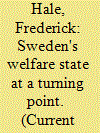

|
|
|
|
|
| Publication |
2012.
|
| Summary/Abstract |
What concerns social scientists, of course, is the question of who will support an aging population legally entitled to lifelong social security.
|
|
|
|
|
|
|
|
|
|
|
|
|
|
|
|
|
|
|
|
|